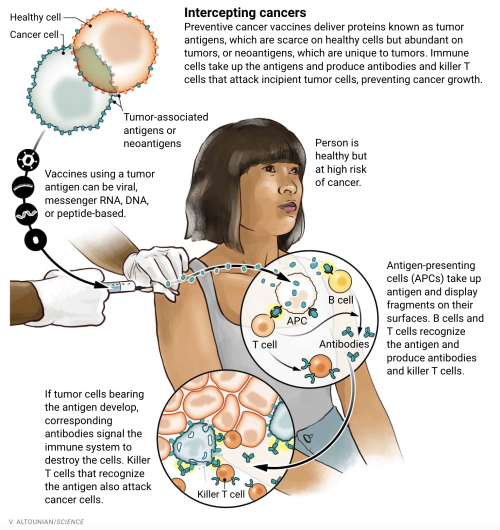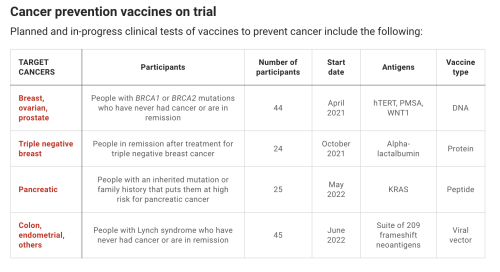mednerds:New generation of cancer-preventing vaccines could wipe out tumors before they form By
mednerds:New generation of cancer-preventing vaccines could wipe out tumors before they form By Jocelyn Kaiser (Science). doi: 10.1126/science.abq3411. When Dave Dubin learned at age 29 that he had colon cancer, it wasnt a big surprise. His grandfather and father had both survived the disease. “It was almost the Dubin way, and we just went on,” Dubin says. He had surgery and chemotherapy, but his cancer came back 10 years later. Genetic testing finally found an explanation for his family’s trials: a mutation in a DNA repair gene that lets genetic errors pile up in dividing cells. The disease, Lynch syndrome, comes with up to a 70% lifetime risk of cancer. Dubin, 55, gets annual colonoscopies, endoscopies, and imaging scans, which caught a third cancer, in his kidney. His eldest son, Zach Dubin, 26, inherited the DNA repair mutation and also regularly gets checked for cancer. “It’s no fun. Nobody enjoys it,” Dave Dubin says—not the 2-day colonoscopy prep and procedure, nor the worrying about possible tumors. The disease also turned him into an activist. He and his family in Haworth, New Jersey, launched a nonprofit, AliveAndKickn, to promote research and awareness of Lynch syndrome, which affects an estimated 1.1 million people in the United States. “There is a lot of anxiety in this patient population,” says oncologist and geneticist Eduardo Vilar-Sanchez of the MD Anderson Cancer Center. “It is a big psychological burden.” In hopes of easing that strain, Vilar-Sanchez will soon lead a clinical trial of a vaccine to prevent or at least delay Lynch-related cancers. If it works, Dave Dubin says, “it could be huge.” Vaccines to prevent certain types of cancer already exist. They target viruses: hepatitis B virus, which can trigger liver cancer, and human papillomavirus, which causes cervical and some other cancers. But most cancers are not caused by viruses. The Lynch vaccine trial will be one of the first clinical tests of a vaccine to prevent nonviral cancers. The idea is to deliver into the body bits of proteins, or antigens, from cancer cells to stimulate the immune system to attack any incipient tumors. The concept isn’t new, and it has faced skepticism. A decade ago, a Nature editorial dismissed a prominent breast cancer advocacy group’s goal of developing a preventive vaccine by 2020 as “misguided,” in part because of the genetic complexity of tumors. The editorial called the goal an “objective that science cannot yet deliver.” But now, a few teams—including one funded by the same advocacy group, the National Breast Cancer Coalition (NBCC)—are poised to test preventive vaccines, in some cases in healthy people at high genetic risk for breast and other cancers. Their efforts have been propelled by new insights into the genetic changes in early cancers, along with the recognition that because even nascent tumors can suppress the immune system, the vaccines should work best in healthy people who have never had cancer. Keep reading -- source link
Tumblr Blog : mednerds.tumblr.com
#science#medicine#academia#oncology#medblr#health

